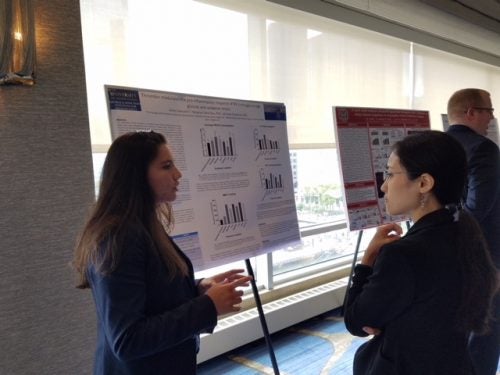IN THE LAB
Young Investigator Q&A: Jaclyn Iannucci
Neuroscience graduate student Jackie Iannucci is looking into the role of microglial cells in Alzheimer’s disease.

THINK OF MICROGLIA AS ROVING VACUUMS, the scavengers that eat up harmful debris in the brain. Normally, they help keep the brain healthy. But research by Ryan Institute Executive Director Paula Grammas has indicated that microglia may respond to a toxic cycle of inflammation in the blood vessels by producing destructive proteins of their own, further driving the death of brain cells that occurs in Alzheimer’s disease. Neuroscience graduate student Jaclyn Iannucci has been working in the Grammas lab to investigate this hypothesis.
Your work focuses on neuroinflammation. Why is that an important area of research?
Neuroinflammation is a growing research focus for Alzheimer’s disease. Researchers are recognizing that there are many different mechanisms behind Alzheimer’s, not just the plaques and tangles we generally associate with the disease. We think that targeting some of these additional areas, like neuroinflammation, can improve treatment of the disease.
For our lab, this is an interesting area because there is a clear intersection between the cardiovascular risk factors we study and an increase in inflammation in the body and brain. We know that our protein of interest, thrombin, is responsible for inflammatory processes in cardiovascular diseases, and it’s likely involved in inflammation in the brain as well. So for us, looking into what drives chronic neuroinflammation is a natural progression from past work looking at cardiovascular disease and particularly thrombin.
What do you find most interesting about your microglia research?
I think the thing I find most interesting about the microglia research is the complexity of it. It isn’t just a yes or no answer; there’s a more complicated picture. Microglia respond to their environment, and sometimes you want their response to be pro-inflammatory. Other times, that could be bad. The context is so important for understanding their response, and to me that makes the research challenging but also interesting.
Why did you choose to study Alzheimer’s?
My grandpa had Alzheimer’s. He died at the beginning of my junior year of high school, right after I turned sixteen. By the end, he couldn’t do things on his own. He would eat and not know when to stop eating. He didn’t know my dad’s name anymore. I remember the impact that had on my dad. He was the youngest of four, and he and my grandfather had always been really close. It was rough. This was the main reason I became interested in neurodegenerative disease research. I saw how terrible Alzheimer’s is, and I wanted to make a difference.
Most young people aren’t thinking about Alzheimer’s. What do you wish they knew about brain health?
If you’re not exposed to the disease firsthand, like I was, I think it’s hard to believe it’s going to be important. There are so many other things more present. You think, “No one in my family has it, so I’m not going to get it,” or “By the time I’m 80, it will be fine.” I think what younger people often don’t realize is that the damage to your brain that comes about in Alzheimer’s is actually starting much younger. Your best chance of staying healthy throughout your life is taking care of yourself from an early age. I’m not saying your mid-twenties totally determine your fate, but certainly there is impact from that stage of your life.
In general, I wish young people would recognize that your brain is just like any other part of your body. It needs to be taken care of properly (with good diet, sleep, and exercise) in order to stay healthy.
Jaclyn Iannucci has recently been the recipient of two competitive scholarships, attending the Alzheimer’s Association International Conference this summer and participating on a Young Investigator Scholarship at the Alzheimer’s Drug Discovery Foundation annual conference. She is a candidate for a Ph.D.’21 in neuroscience.
